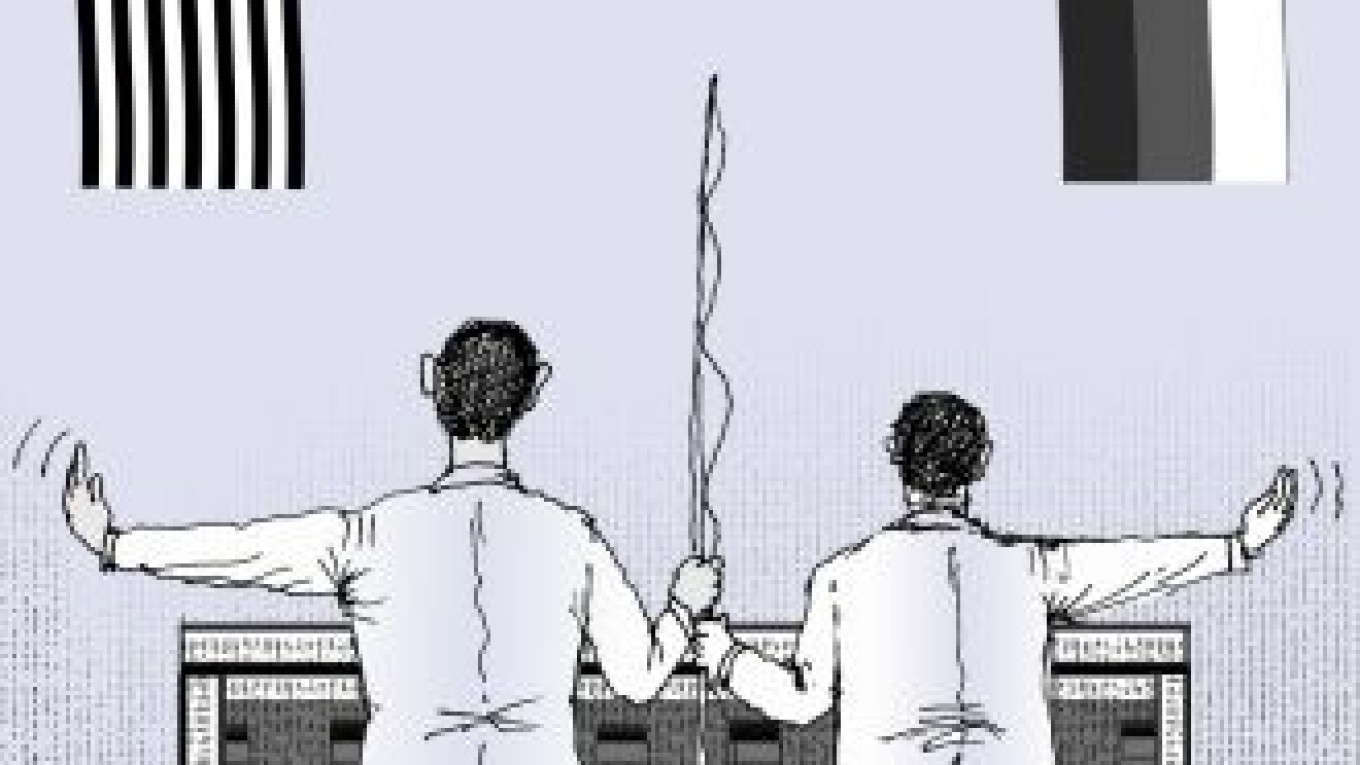As they say in Italy, a little fish is better than a big cockroach. This also applies to the New START agreement that Presidents Barack Obama and Dmitry Medvedev signed Thursday. Despite all the hyped-up rhetoric that the treaty is “historic,” in the end the nuclear arsenals of both sides will be reduced by only 100 to 200 deployed warheads.
Unlike other treaties between the two countries that were truly historic — such as the 1987 Intermediate-Range Nuclear Forces Treaty in which an entire category of weapons was destroyed — the only warheads that will be destroyed under the New START are those that will be decommissioned and were scheduled to be destroyed anyway. All other warheads exceeding the 1,550 limit imposed by the treaty will be stored in military warehouses.
Moreover, the treaty gives the United States the right to refit strategic delivery vehicles with high-precision conventional weapons. Top on the U.S. priority list for refitting are B-1B strategic bombers and four Trident nuclear submarines.
One of the more curious points of the treaty that the Russian side insisted on is that U.S. missile defense interceptors stationed in Europe or on the seas bordering Russia would not be refitted to become offensive systems. Generals and politicians dreamed up this scenario a few years ago to scare Russians and mobilize public opinion against the United States and NATO. According to their fantasy, the treacherous Americans are secretly outfitting interceptors in Europe with nuclear warheads to bring Russia to its knees.
This makes great science fiction except for one problem: Because of their heavy weight and other factors, nuclear warheads cannot be installed on current interceptors. Moreover, converting interceptors into offensive nuclear weapons would require dozens of test launches. If these launches had taken place, they would have been easily caught by surveillance, and we would have heard about them a long time ago fr om journalists, politicians and military analysts from all over the world.
Since the notion of converting interceptors to offensive weapons is complete rubbish, is was easy for U.S. negotiators to concede to the Russians on this issue by including the conversion prohibition in the agreement.
Washington decided that the best way to give the “reset” a real boost would be to conclude a nuclear arms reduction treaty with Moscow — the only area in which Russia still enjoys parity with the United States. During the Cold War, “parity” was defined in terms of an equal number and quality of nuclear warheads and delivery vehicles. But when the Cold War ended, this definition changed significantly. Now — at least from the U.S. perspective — U.S.-Russian nuclear parity is understood to mean Russia’s ability to inflict unacceptable damage to the United States in the form of a retaliatory nuclear strike. Since U.S. strategic missile defense, which consists of only 30 interceptors in Alaska and California, is no threat whatsoever to Russia’s strategic forces and its ability to deliver a retaliatory nuclear strike, Moscow has no problem at all maintaining nuclear parity with Washington. Unfortunately, Russia still adheres to the old Cold War definition of parity and to the notion that the United States is capable of delivering a first nuclear strike against Russia, regardless of the consequences. This anachronistic thinking was seen in the conditions Russia put forward, turning much of the negotiations into a laughable parody of the Cold War.
There may very well be a second act of this parody. The treaty must be ratified by the U.S. Senate, wh ere it faces strong Republican opposition. It will take a minimum of? six to 12 months to ratify the treaty in the Senate because of all the horse-trading and debate that will take place between Republicans and Democrats. In the U.S. Congress, there is a real opposition, while in the State Duma there is only a cheap imitation of it. But if Mevdevev wants simultaneous ratification, the Duma may have to simulate a discussion and debate about the New START and drag it out for months.
To most people, this will look like a parody of debate. After all, everyone knows that the Duma is not a place for discussion.
Alexander Golts is deputy editor of the online newspaper Yezhednevny Zhurnal.
A Message from The Moscow Times:
Dear readers,
We are facing unprecedented challenges. Russia's Prosecutor General's Office has designated The Moscow Times as an "undesirable" organization, criminalizing our work and putting our staff at risk of prosecution. This follows our earlier unjust labeling as a "foreign agent."
These actions are direct attempts to silence independent journalism in Russia. The authorities claim our work "discredits the decisions of the Russian leadership." We see things differently: we strive to provide accurate, unbiased reporting on Russia.
We, the journalists of The Moscow Times, refuse to be silenced. But to continue our work, we need your help.
Your support, no matter how small, makes a world of difference. If you can, please support us monthly starting from just $2. It's quick to set up, and every contribution makes a significant impact.
By supporting The Moscow Times, you're defending open, independent journalism in the face of repression. Thank you for standing with us.
Remind me later.


